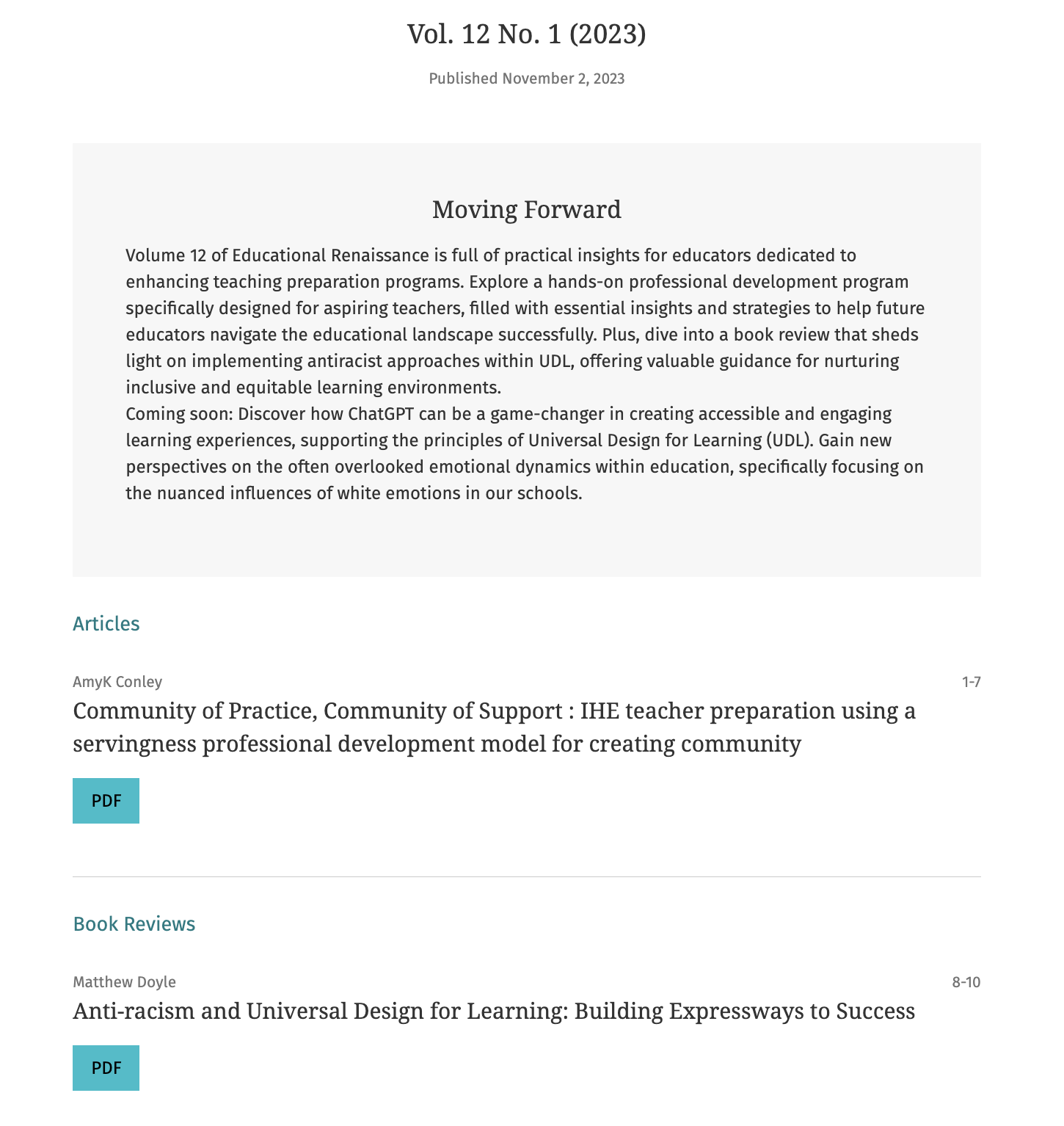Abstract
This paper details a critical ethnography I conducted in my own classroom—an undergraduate children’s literature course for pre-service elementary educators—in which I analyze White students’ emotional responses to multicultural children’s literature through the lens of a cultural politics of emotion (Ahmed, 2015; Zembylas, 2008). In my paper I use critical Whiteness studies and critical emotion studies to analyze the effects of these emotional responses, complicating the assumption that emotions are a bridge to empath and exploring how White emotional performativity often serves to deflect from authentic critical discourse, reinforcing White supremacy in educational spaces. I look reflexively at my own pedagogy as a White educator, noticing the ways in which my failure to critically interrogate White emotions contributed to a classroom culture that valued majority voices over the voices of students of color. I conclude with the impacts of this study on my own commitments as a teacher-researcher.
References
Ahmed, S. (2007). A phenomenology of whiteness. Feminist Theory, 8(2), 149-168. https://doi.org/10.1177/1464700107078139
Ahmed. S. (2015). The cultural politics of emotion (2nd ed.). Routledge.
Applebaum, A. (2016). Critical whiteness studies. In Oxford research encyclopedia of education. https://doi.org/10.1093/acrefore/9780190264093.013.5
Bishop, R. S. (1990). Mirrors, windows, and sliding glass doors. Perspectives, 6(3), ix-xi.
Boehm-Turner, A. (2020). Rereading and rewriting teachers’ stories of felt impossibilities (Order No. 28152389) [Doctoral dissertation, University of Minnesota]. ProQuest Dissertations & Theses A&I.
Boler, M. (1997). The risks of empathy: Interrogating multiculturalism’s gaze. Cultural Studies, 11(2), 253-73. https://doi.org/10.1080/09502389700490141
Boler, M. (1999). Feeling power: Emotions and education. Routledge.
Boler, M., & Zembylas, M. (2003). Discomforting truths: The emotional terrain of understanding differences. In P. Tryfona (Ed.), Pedagogies of difference: Rethinking education for social justice (pp. 110–136). Routledge.
Clough, P. T. (2007). The affective turn: Theorizing the social. Duke University Press.
Delgado, R. (1996). Rodrigo’s eleventh chronicle: Empathy and false empathy. California Law Review, 84, 61-100.
Fine, M. (1994a). Dis-stance and other stances: Negotiations of power inside feminist research. In A. Gilton (Ed.), Power and method: Political activism and educational research (pp. 13-35). Routledge.
Fine, M. (1994b). Working the hyphens: Reinventing self and other in qualitative research. In N.K. Denzin & Y.S. Lincoln (Eds.), Handbook of qualitative research (pp. 70–82). Sage Publications.
Geertz, C. (1998). Deep hanging out. New York Review of Books, 45(16), 69–72. https://www.nybooks.com/articles/1998/10/22/deep-hanging-out/
Grinage, J. (2019). Reopening racial wounds: whiteness, melancholia, and affect in the English Classroom. English Education, 51(2), 126-150. https://www.proquest.com/scholarly-journals/reopening-racial-wounds-whiteness-melancholia/docview/2166930503/se-2?accountid=14586
Jupp, J. C., Berry, T. R., & Lensmire, T. J. (2016). Second-wave white teacher identity studies: A review of white teacher identity literatures from 2004-2014. Review of Educational Research, 86(4), 1151-1191. http://www.jstor.org/stable/44668246
Jupp, J. C. (2017). What learning is needed for white teachers’ racevisible teaching? Racialised curriculum recoding of cherished knowledges. whiteness and Education, 2(1), 15-31. https://doi.org/10.1080/23793406.2017.1373032
Kincheloe, J. L., & McLaren, P. (2005). Rethinking critical theory and qualitative research. In N. K. Denzin & Y. S. Lincoln (Eds.), The SAGE Handbook of Qualitative Research (pp. 303-342). Sage Publications.
Madison, D. S. (2020). Critical ethnography: Method, ethics, and performance (3rd ed.). Sage Publications.
Matias, C. E., & Mackey, J. (2016). Breakin’ down whiteness in antiracist teaching: Introducing critical whiteness pedagogy. The Urban Review, 48, 32-50. https://doi.org/10.1007/s11256-015-0344-7
Matias, C. E., & Zembylas, M. (2014). “When saying you care is not really caring”: Emotions of disgust, whiteness ideology, and teacher education. Critical Studies in Education, 55(3), 319-337. https://doi.org/10.1080/17508487.2014.922489
Ohito, E. O. (2016). Making the emperor’s new clothes visible in anti-racist teacher education: Enacting a pedagogy of discomfort with white preservice teachers. Equity & Excellence in Education, 49(4), 454-467. Routledge. https://doi.org/10.1080/10665684.2016.1226104
Spelman, E.V. (1997). Fruits of sorrow: Framing our attention to suffering. Beacon Press.
Trainor, J. S. (2006). From identity to emotion: Frameworks for understandings, and teaching against, anticritical sentiments in the classroom. Journal of Advanced Composition, 26(3-4), 643–655. https://www.jstor.org/stable/20866755
Weis, L., & Fine, M. (2000). Construction sites: Excavating race, class, and gender among urban youth. Teachers College Press.
Yeung, J. G., Spanierman, L. B., & Landrum-Brown, J. (2013). “Being white in a multicultural society”: Critical whiteness pedagogy in a dialogue course. Journal of Diversity in Higher Education, 6(1), 17-32. https://doi.org/10.1037/a0031632
Yoon, I. H. (2012). The paradoxical nature of whiteness-at-work in the daily life of schools and teacher communities. Race, Ethnicity and Education, 15(5), 587-613. https://doi.org/10.1080/13613324.2011.624506
Zembylas, M., & Boler, M. (2002). On the spirit of patriotism: Challenges of a “pedagogy of discomfort.” Special issue on Education and September 11. Teachers College Record. https://meganboler.files.wordpress.com/2016/02/on_the_spirit_of_patriotism_challenges_o.pdf
Zembylas, M. (2008). Trauma, justice and the politics of emotion: The violence of sentimentality in education. Discourse: Studies in the Cultural Politics of Education, 29(1), 1-17. https://doi.org/10.1080/01596300701801278
Zembylas, M. (2016). Making sense of the complex entanglement between emotion and pedagogy: Contributions of the affective turn. Cultural Studies of Science Education, 11, 539-550. https://doi.org/10.1007/s11422-014-9623-y

